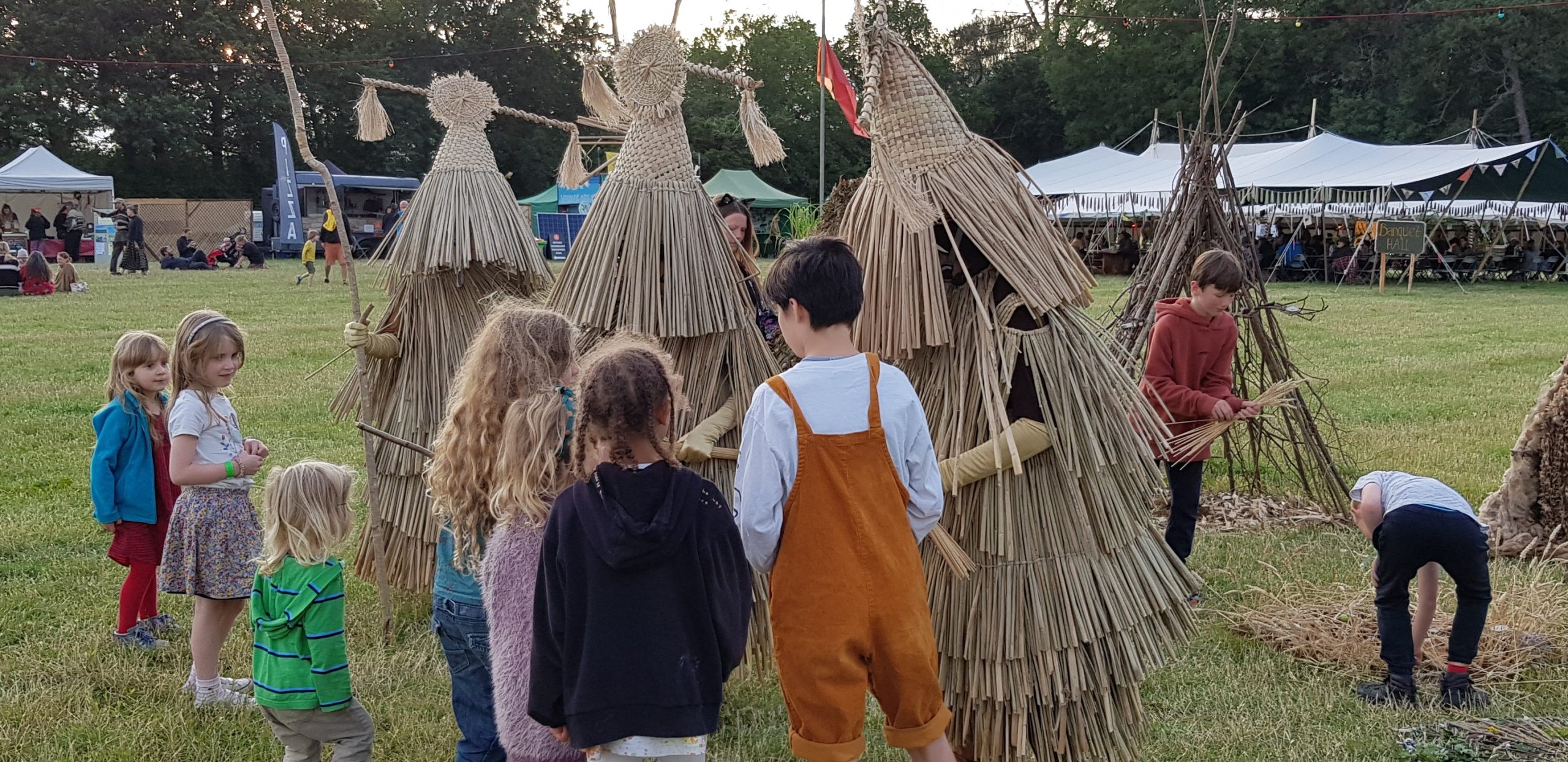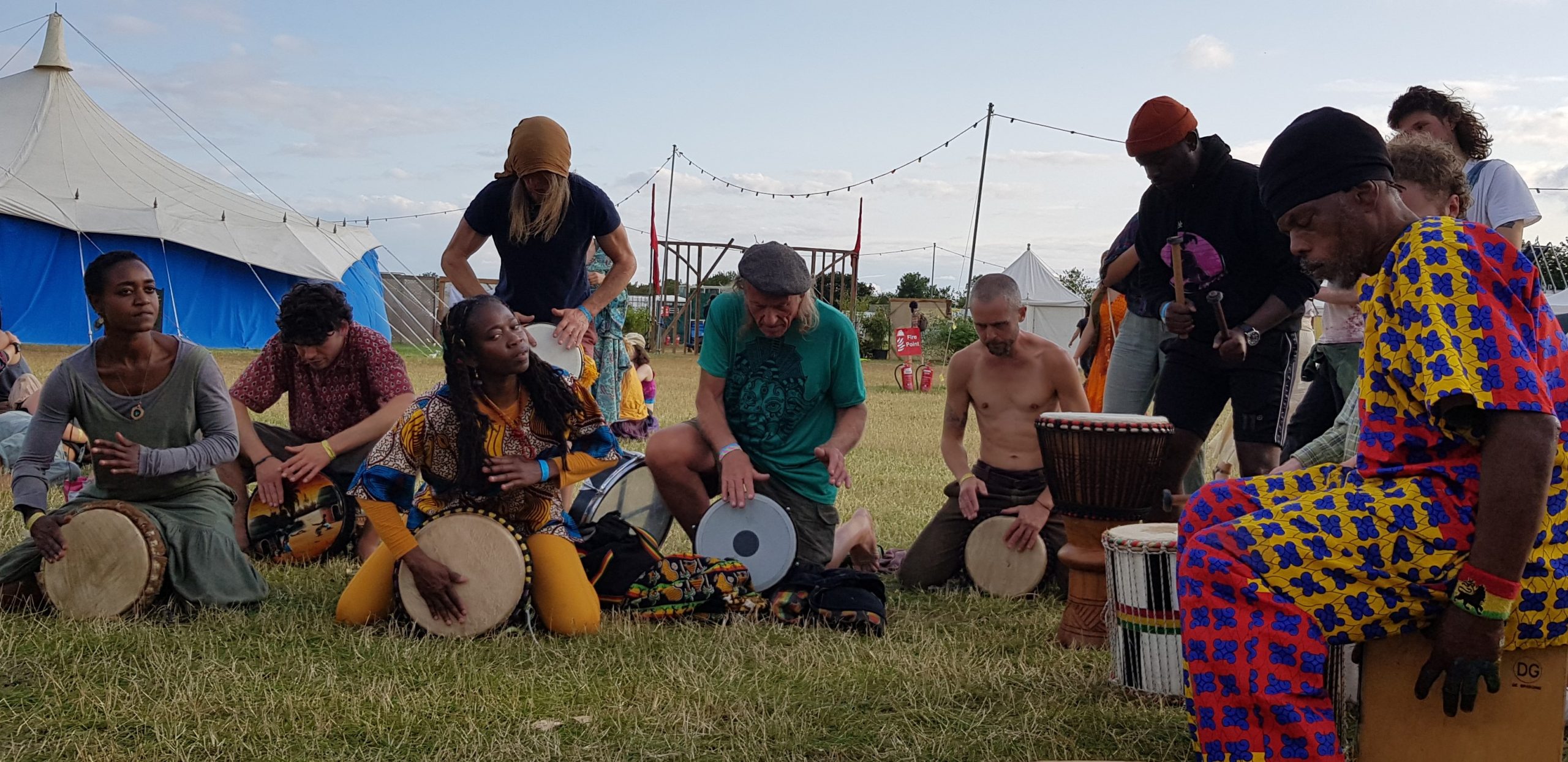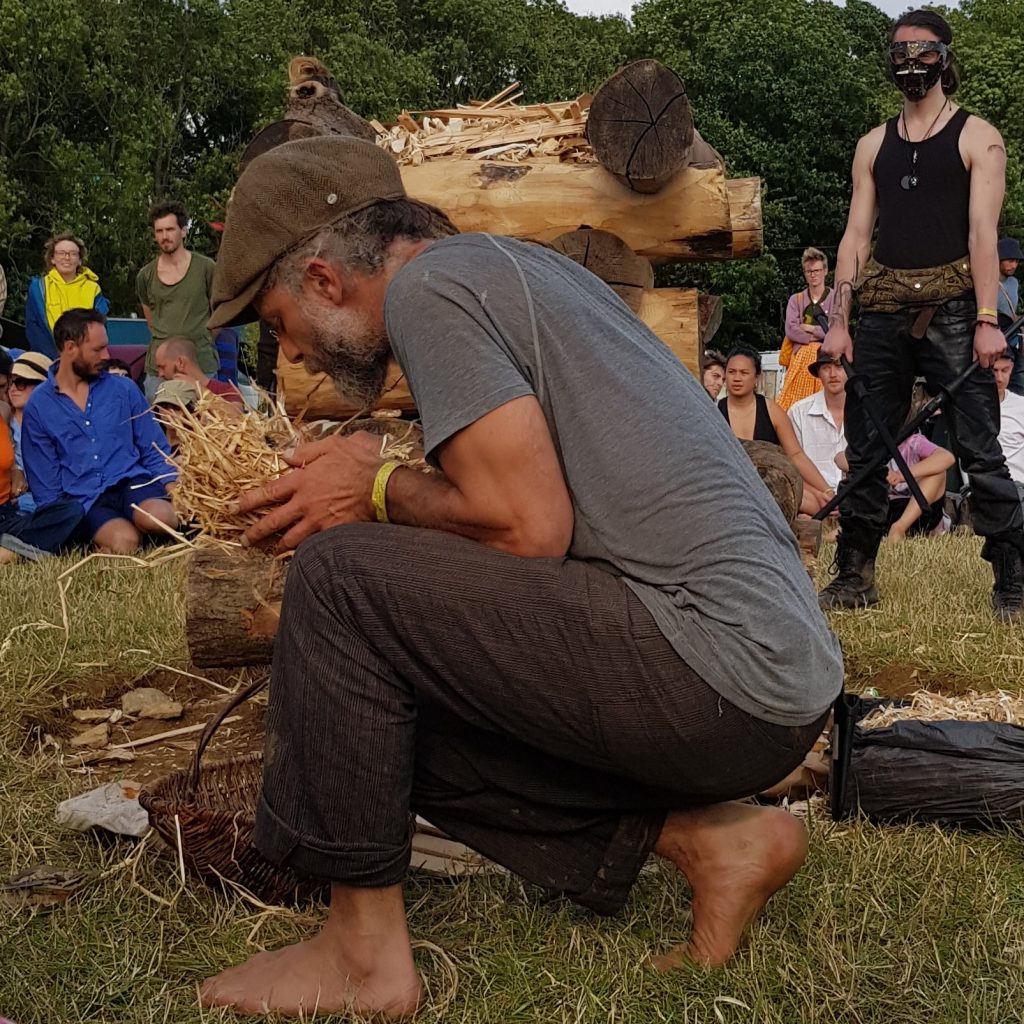Head, heart, hands and dancing feet at the Land Skills Fair

5 September 2023
11 minute read
We’re part of a rich eco-system of many groups working for change – it makes sense to share, learn and collaborate. So when Yaz Brien from our team attended this year’s Land Skills Fair, they were excited to connect with the landworkers’ movement in the UK and draw inspiration for our work of Transition.
Each year, the Land Skills Fair is organised by the Land Workers Alliance (LWA), a member-led union of farmers, growers, foresters and land-based workers, rooted in food sovereignty, agroecology, the right to food, and social justice. And what I found was a solid mix of head, heart and hands, and plenty of dancing feet!
Arriving too late for the Opening Ceremony, it was tents up and a wander into the main area to warm up by the communal fire. In the closing light I could only just make out the marquees and structures that circled the field. By daylight, they would be filled with traditional crafts, skills, talks, workshops and more.

With so much to choose from I tried to focus on sessions that directly relate to my work and interests in community technology, cultivating care, rediscovering rituals for life and land justice; along with those activities I stumbled on, it gave me much food for thought for our work in Transition.
Community Technology
In my Vive Engagement Role at Transition Together, developing our online networking platform for the Transition movement and friends, I think a lot about how we can embed accessibility and healthy human cultures into the design of our online tools. It seemed a natural choice to start off with a workshop led by Garethe Hughes, an IT developer and market gardener, entitled Agroecological Tech: What Would It Mean To Apply the Same Ethics to ALL of the Technologies We Use?
We began by listing the types of software we use in our projects – operating systems, browsers, social media, websites, tools for messaging, graphics and productivity. In small groups we answered questions to help us understand the ownership and characteristics of the tech we use, how they impact our communities, and what community-based alternatives might look like.
As we might expect, all of us were using one or more tools created and owned by corporations and there were interesting conversations about the unpaid labour we end up doing for those companies. How social media analytics train us to produce and share content in ways that help platforms extract data and attract advertising. And how they benefit from unethical practices because controversies, polarisation and ‘trolling’ are attention grabbing and therefore ‘good for business’.
I spoke a little about Vive and HumHub, the open-source social network software that hosts it, and how we might understand it as ‘slow tech’ in similar ways to ‘slow food’. Without algorithms, advertising or extraction, our focus is on creating the conditions for depth, relationships and mutual support that can also thrive in our offline worlds. One of the challenges for democratic community-owned tech is the reliance on volunteers for development and moderation, and one participant suggested how this could be unlocked through policies such as Universal Basic Income.
Cultivating Care
I arrived a little late to the marquee hosting Cultivating Care with Jo Kamal (REAL), Clem Sandison (LWA), Sara Venn (Incredible Edible Bristol) and Soil Sister Sandra (Go Grow With Love CIC). The session was already in full swing with a conversation about unwaged care work and the Care Income Now Campaign, which calls for a care income to prioritise and support the work of all those, of every gender, who care for people, the urban and rural environment, and the natural world.

We heard about listening as care, the importance of reciprocity, and of joyful places to connect with nature and each other. It was noted how we’re often restricted to the scale of community garden or peri-urban land, and while there is much philanthropy in the UK, there is less appetite in divesting of or redistributing land.
When asked about how we might design care into our projects and enterprises whilst remaining financially viable, Jo invited us to think about ableism and to look to disability justice movements for frameworks to use in our projects. While Clem Sandison spoke of the importance of balancing the social, ecological and economic – using this to develop our vision and the design of our organisational systems.
A theme that emerged in many places was that of ritual and ceremony, and here we heard about it as decolonial work. How the systems that we live under have depoliticised and decentred love, care and ritual. And the importance of looking back in order to move forwards, for ancestral knowledge to come through our actions.
Rituals for Life
Later in the day I followed this thread into a practical session called Rituals for Life led by ceremonialist and healer Isla McLeod. There were experiences shared of grief at the loss of ancestral knowledge, the absence of ritual and ceremony on these lands, and the power of reinvigorating ceremonial practices collectively. Isla reminded us that we can turn to nature itself, the trees and the stones, as our elders.
And as we strive to (re)create rituals within our communities we might look for what connects us all, the wisdom in nature and the elements, designing in response to the places in which they are held. It made me think of the Guardian piece by Anita Roy, of Transition Town Wellington, titled It’s Never Too Late to Start a New Tradition in which she recounts taking part in a “brand new ancient ceremony: decorating and blessing the well” in Ashbrittle, Somerset.
Land Justice
It was good to see the familiar faces of Dee Woods (food action-ist and co-founder of Granville Community Kitchen) and Cleo Lake (activist, artist and former Lord Mayor of Bristol) leading the session on Reparations and Land Justice Legacy.

Dee spoke about how the ‘beast started at home’, through the Enclosures, and was then exported to lands colonised by Britain. How African ancestors were kidnapped and dehumanised, to become commodities traded and sold in pursuit of greed. How cultures and lives were destroyed through centuries of extraction and violence which achieved development and growth for the minority of the world, hastening climate change in the process. How systems of inequity, such as patriarchy and racism, have left a legacy of unequal access to basics such as health, housing and education.
We heard how reparations must be more than an apology, and not merely financial. That one off payments or funding is insufficient to create a forward legacy, which will require committed investment. The need for justice and deep holistic healing, of repairing trauma and disconnection from land and relationships, and the importance of campaigns such as Land In Our Names.
Learning from Nature
At points of the weekend I’d sit myself quietly in the woods to land into my body to integrate the thoughts and feelings that emerged after each session. Or I’d catch the eye of a friend, sit down with them to take a breath and to express how we were feeling. There were moments of tenderness, vulnerability and mutual support, not least at the session on Learning from Nature to Transform our Relationship with Death: Personal Stories and Discussion from a Willow Coffin Weaver, a Burial Shroud Maker and an Ethical Butcher and Tanner.

Rights of Nomadic People
The various spaces where I encountered Thomas McCarthy, an Irish Traveller, Storyteller and Singer, on panel discussions or singing and storytelling, were also deeply impactful.

As a person of mixed Irish, Pakistani and English heritage, I have much in common with travellers of all backgrounds in experiences of racism, marginalisation and discrimination. And traveller ways of living off-grid and close to the land offer lessons to us all as we try to create a liveable future on this earth. Thomas McCarthy (pictured) is incredibly skilled at delivering Irish and Irish traveller history in clear and accessible ways, the injustices and complexity, before lifting you right back up with a song or story.
While there is a significant national shortage of places for nomadic Gypsies and Travellers to legally and safely stop, the Police, Crime, Sentencing and Courts Act that came into force last year has criminalised those living on the roadside. People who live on roadside camps may now face time in prison, a £2500 fine or their home being taken from them. So it was good to witness the solidarity of a standing room only audience at The Threat to Nomadism: A Panel Discussion on Traveller and Nomadic Rights.

A favourite moment was when I encountered Straw Mummers holding a ceremony responding to the concept that there are only 60 Harvests left if soil degradation continues. These silent figures would gently bow and hand a stalk of grain to anyone standing near, pointing to a small circle where they could be placed in the earth with those of others. Despite not a word uttered by the adults the ritual was fully understood and communicated to me by the children, who were entranced with the figures. And much laughter ensued as the silence was broken by the screams and guitars of Menstrual Cramps, a feminist punk band, playing on a nearby stage.

As the vast array of craft and skills spaces began to pack down on the last day, the final touches were made to a closing ceremonial fire crafted by woodworker Richard Anderson.
And after the exuberance of a ceilidh, people gathered one last time to hear speeches, sing and dance together, and join in shouts of ‘Viva La Campesina’ while the fire was lit by flint. As the flames took hold drummers responded to the energy of the crowd, inviting those close by to take a drum and join in.


Food for thought
I was reminded of how excited I was some years ago to see the LWA counted amongst the membership of La Via Campesina, the International Peasants Movement. Building collective power, networks, solidarity and exchange, doing that both locally and internationally, feels key to bringing about the transformative change that we need in the face of multiple crises.
As a member of the Transition Together team I’ve been listening to the questions posed by the Caretaker Group as they explore the conditions for Transition Hub/s in England and Wales to form. To support Transitioners in their local areas as well as connecting, sharing and learning across the international movement. Some of their focus has been on how a Hub might be organised, who and how it represents, and what might need to be heard, learnt and transformed in order for there to be equity.
It’s been interesting to find out more about LWA’s organising structure which has representation regionally and sectorally, and also supports identity-based organising for members who are marginalised in landwork and wider society. Currently they have an LGBTQIA+ working group (OOTL), a Black and People of Colour working group (REAL), as well as a youth arm (FLAME). Each hosted spaces, meetings or sessions at the Land Skills Fair and I think this way of organising directly fed into the richness and intersectionality of the programme, and the diversity of those attending.
The genuine leadership and facilitation of spaces by people of diverse and often marginalised backgrounds, the thought and care that was evident in workshop content, the offering of traditional skills and crafts, the subsidised tickets for BPOC and low income folks, the creation of spaces for people to meet, eat, sing and dance together created nourishing conditions for a movement to connect, reflect and leave revitalised. I left grateful for the reminder that we’re not doing this work alone, and that together we can transform our future.
If you’d like to know more about the Land Workers Alliance they’ve just published a new book – With the Land: Reflections on Land Work and Ten Years’ of the Landworkers Alliance